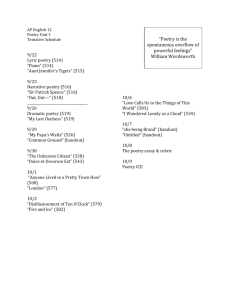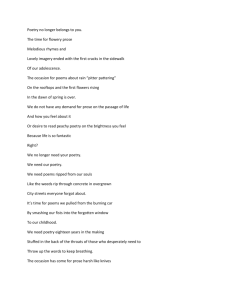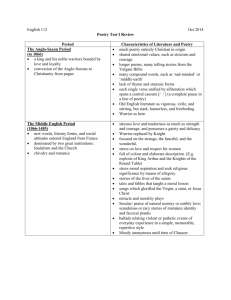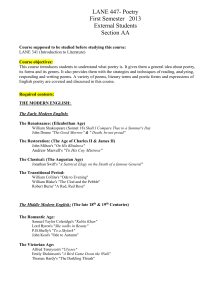Final Exam - Mary Adams`s Web Site
advertisement
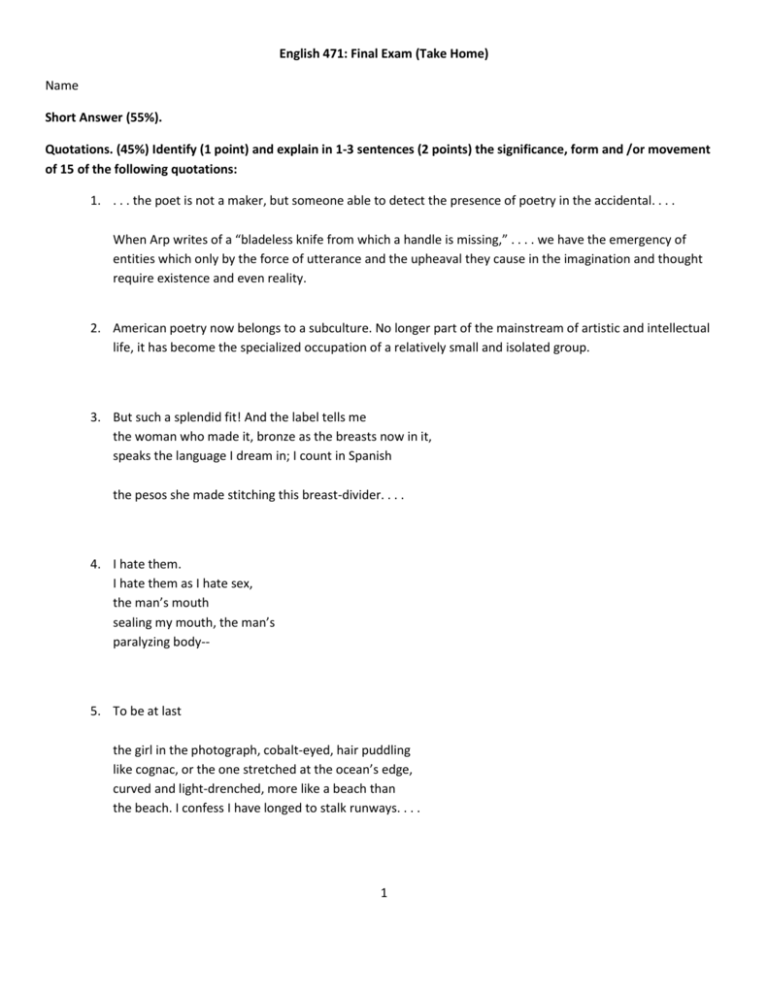
English 471: Final Exam (Take Home) Name Short Answer (55%). Quotations. (45%) Identify (1 point) and explain in 1-3 sentences (2 points) the significance, form and /or movement of 15 of the following quotations: 1. . . . the poet is not a maker, but someone able to detect the presence of poetry in the accidental. . . . When Arp writes of a “bladeless knife from which a handle is missing,” . . . . we have the emergency of entities which only by the force of utterance and the upheaval they cause in the imagination and thought require existence and even reality. 2. American poetry now belongs to a subculture. No longer part of the mainstream of artistic and intellectual life, it has become the specialized occupation of a relatively small and isolated group. 3. But such a splendid fit! And the label tells me the woman who made it, bronze as the breasts now in it, speaks the language I dream in; I count in Spanish the pesos she made stitching this breast-divider. . . . 4. I hate them. I hate them as I hate sex, the man’s mouth sealing my mouth, the man’s paralyzing body-- 5. To be at last the girl in the photograph, cobalt-eyed, hair puddling like cognac, or the one stretched at the ocean’s edge, curved and light-drenched, more like a beach than the beach. I confess I have longed to stalk runways. . . . 1 6. What is to be insisted upon is that the poet must develop or procure the consciousness of the past and that he should continue to develop this consciousness throughout his career. What happens is a continual surrender of himself as he is at the moment to something which is more valuable. The progress of an artist is a continual self-sacrifice, a continual extinction of personality. 7. Geneva was the wild one. Geneva was a tart. Geneva met a blue-eyed boy and gave away her heart. 8. Marry me, schoolgirl uniform, white blouse, plaid miniskirt, kneehigh socks. Glitter eyeshadow, hiphugger stretchpants, your midriff is an island, your diamondstudded bellybutton a city I want to get lost in.. 9. Unreal City, Under the brown fog of a winter dawn, A crowd flowed over London Bridge, so many, I had not thought death had undone so many. Sighs, short and infrequent, were exhaled, And each man fixed his eyes before his feet, Flowed up the hill and down King William Street. . . . 10. Curled and tightened blind to the end torching our enemies we sing to Jesus Blind to the end split up like nuclei we sing to Jesus in a chain reaction 2 11. He knew who everybody’s hero was. He said he was the last Pachuco left and go expelled for saying so, and cause he wore a flat-top with a perfect set of wings, and when she asked us who had cussed we never told, but that Miss Lee she guessed. 12. The art of losing isn’t hard to master; so many things seemed filled with the intent to be lost that their loss is no disaster. 13. Scientists are just beginning to uncover all the elements, things, and processes that can be described through fractals. Clouds follow fractal patterns. . . . Certainly the discovery of order within the turbulent forms of nature should encourage us to search for patterns within the turbulent forms of art. Fractal form may allow a more precise measure of those poetic shapes that aren’t governed by the strategies of prosody. 14. wade through black jade. Of the crow-blue mussel-shells, one keeps adjusting the ash-heaps; opening and shutting itself like an injured fan. 15. I put my troubles in the computer To find out what’s troubling me. I say I put my troubles in the computer To see what’s the matter with me. My card had so many holes, Holes was all that I could see. 16. The most pervasive influence on modern Black poetry has been the idea of the audience. Black poets bear witness to the oft-quoted observation by W.E.B. DeBois that the Black American “ever feels his twoness.” 3 17. They call me skinhead, and I got my own beauty. It is knife-scrawled across my back in sore, jagged letters, it’s in the way my eyes snap away from the obvious. I sit in my dim matchbox, on the edge of a bed tousled with my ragged smell, slide razors across my hair. . . . These are the duties of the righteous, the ways of the anointed. 18. Instead, arriving in the United States of America in 1969, I have not stopped learning more about the malleability of English poetry, particularly in its American manifestations. I have learned to enjoy the American appetite for the novel and casual, and find the many accents in U.S. poetry an ongoing destabilizing yet regenerative force. Identify and give an example from our reading of 5 of the following terms (2 points each): 1. Sestina. 2. Accentual verse. 3. villanelle 4. paradelle 5. pantoum 6. found poem 7. ghazal 8. l-a-n-g-u-a-g-e poetry 4 Essay 1: Explication (20%). Using the instructions for close reading found at the web site http://www.personal.psu.edu/users/s/a/sam50/closeread.htm , write an explication of one of the following three poems. Include a discussion of the poems’s word choice, imagery, figurative language, etymologies, form and formal elements as they affect theme: Mad Girl's Love Song Acquainted with the Night I shut my eyes and all the world drops dead; I lift my lids and all is born again. (I think I made you up inside my head.) I have been one acquainted with the night. I have walked out in rain -- and back in rain. I have outwalked the furthest city light. The stars go waltzing out in blue and red, And arbitrary darkness gallops in: I shut my eyes and all the world drops dead. I have looked down the saddest city lane. I have passed by the watchman on his beat And dropped my eyes, unwilling to explain. I dreamed that you bewitched me into bed And sung me moon-struck, kissed me quite insane. (I think I made you up inside my head.) I have stood still and stopped the sound of feet When far away an interrupted cry Came over houses from another street, God topples from the sky, hell's fires fade: Exit seraphim and Satan's men: I shut my eyes and all the world drops dead. I fancied you'd return the way you said. But I grow old and I forget your name. (I think I made you up inside my head.) But not to call me back or say good-bye; And further still at an unearthly height, O luminary clock against the sky Proclaimed the time was neither wrong nor right. I have been one acquainted with the night. - Robert Frost I should have loved a thunderbird instead; At least when spring comes they roar back again. I shut my eyes and all the world drops dead. (I think I made you up inside my head.) --Sylvia Plath 5 Junk An axe angles The sun shall glory from my neighbor’s ashcan; It is hell’s handiwork, the wood not hickory, The flow of the grain not faithfully followed. The shivered shaft rises from a shellheap Of plastic playthings, paper plates, And the sheer shards of shattered tumblers That were not annealed for the time needful. At the same curbside, a cast-off cabinet Of wavily warped unseasoned wood Waits to be trundled in the trash-man’s truck. Haul them off! Hide them! The heart winces For junk and gimcrack, for jerrybuilt things And the men who make them for a little money, Bartering pride like the bought boxer Who pulls his punches, or the paid-off jockey Who in the home stretch holds in his horse. Yet the things themselves in thoughtless honor Have kept composure, like captives who would not Talk under torture. Tossed from a tailgate Where the dump displays its random dolmens, Its black barrows and blazing valleys, They shall waste in the weather toward what they were. in the glitter of glass-chips, Foreseeing the salvage of the prisoned sand, And the blistering paint peel off in patches, That the good grain be discovered again. Then burnt, bulldozed, they shall all be buried To the depth of diamonds, in the making dark Where halt Hephaestus keeps his hammer And Wayland’s work is worn away. - 6 Richard Wilbur Write Essay 1 here: 7 Essay 2 (25%). Choose Either A or B. A. In her essay “Disruption, Hesitation, Silence,” Louise Glϋck claims, “I am attracted to ellipsis, to the unsaid, to suggestion, to eloquent, deliberate silence. … [W]hat is wanted, in art, is to harness the power of the unfinished. All earthly experience is partial.“ While she believes poetry must communicate with its audience, Glϋck resists the idea that poetry must tell a story or create an argument. She uses the examples of Hans Holbein’s drawings (http://upload.wikimedia.org/wikipedia/commons/8/8b/Holbein_Sir_Thomas_Elyot.jpg ) and Michelangelo’s bound slaves (http://www.ablemuse.com/premiere/bhouston_unfinished.htm), which exploit the power of implication rather than statement and which call our attention to process. Pick five poems by five different poets that we have read for this class, including at least two examples of received forms (blank verse, sestina, ghazal, rap or blues, pantoum, villanelle, rondeau, sonnet) and at least one example of experimental forms (paradelle, found poetry, performance poetry, procedural poetry, list poetry, l-an-g-u-a-g-e poetry) that attempt to “harness the power of the unfinished.” If the poem is part of a movement, include in your discussion how it is characteristic of that movement. If it is in a form, include in your discussion how the poem’s formal elements are used. B. The last century in American poetry has been one in innovation, not only in style but in the nature of those speaking. The same century saw not only an increase in avant-garde and experimental forms (beginning with free verse) but also an enthusiastic revival of traditional forms. And people of every gender, race, region, class, and creed have participated in the increasingly varied poetic landscape. Discuss examples from at least two movements (modernism, formalism, feminism, confessionalism, post colonialism, regionalism) and of at least two received or experimental forms (blank verse, sestina, ghazal, rap or blues, pantoum, villanelle, rondeau, sonnet, found poetry, performance poetry, procedural poetry, list poetry, la-n-g-u-a-g-e poetry) that have reshaped the gender, color, and face of American poetry. Be specific, giving examples of formal and experimental elements within the poems. Begin Essay 2 here: 8


